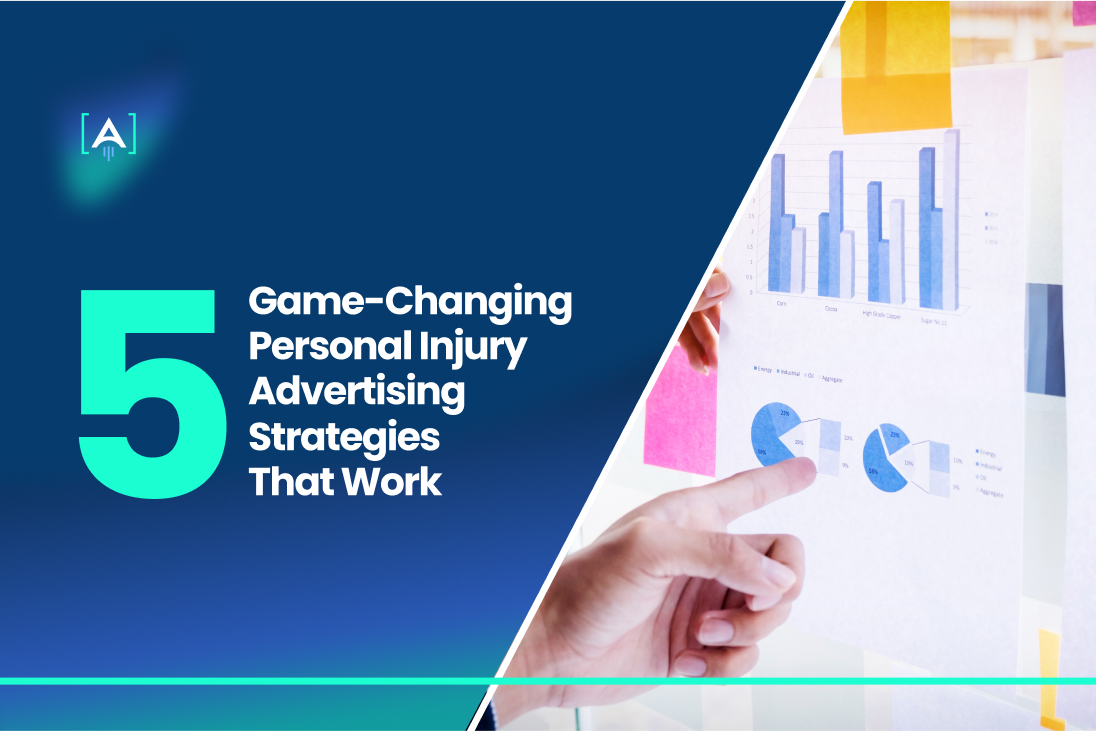Being an excellent personal injury attorney is not enough today. You need to be seen online.
For personal injury law firms and attorneys, visibility is essential for attracting clients and establishing credibility.
The competition is fierce, so standing out is crucial.
We’re here to guide you through personal injury lawyer marketing with game-changing law firm marketing strategies that’ll make you the go-to choice for clients.
Let’s get started!
The Importance of Personal Injury Advertising

(source)
Effective advertising for personal injury law firms is crucial, especially as clients increasingly search for attorneys online.
For example, when someone is injured in a car accident, they often turn to Google to find personal injury attorneys nearby.
Without strong online visibility, your firm may miss out on these potential clients.
Therefore, investing in digital marketing is essential for connecting with those needing legal assistance and establishing credibility.
Personal Injury Law Firm Advertising Essentials
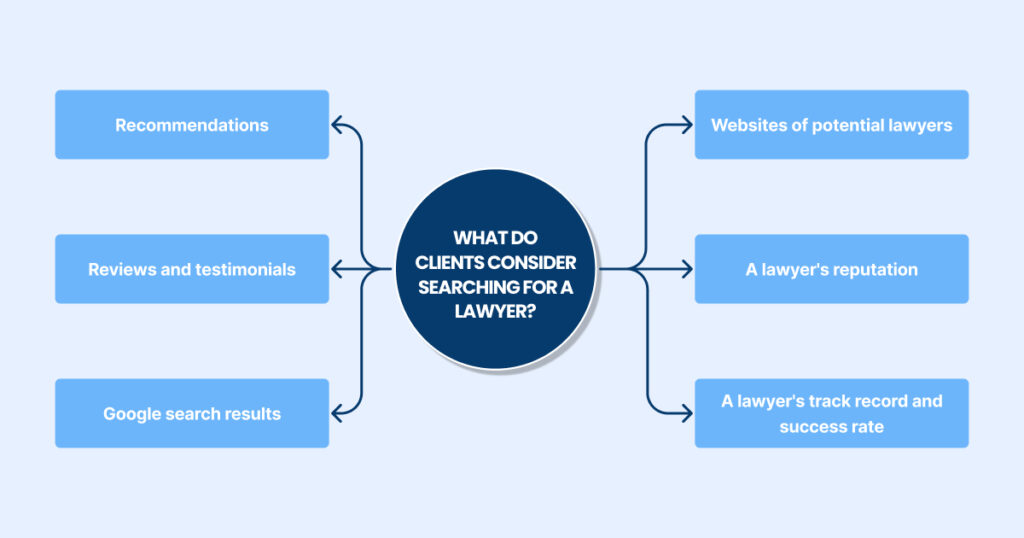
Navigating personal injury law firm advertising can be daunting.
We’re here to break it down for you in simple terms.
You’re a personal injury attorney looking to make a mark online.
You’ve heard about Search Engine Optimization (SEO), but what does it really mean for your firm?
If your website is well-optimized, it’ll show up in search results when someone searches for “personal injury lawyer near me” or “car accident attorney in [city].”
Common Challenges of Personal Injury Practice
In personal injury law firm marketing, experts often face challenges that can impede their marketing efforts.
Let’s delve into the common pitfalls:
- Limited Online Visibility: Many personal injury firms struggle to establish a robust online presence. So, it gets difficult for potential clients to discover their services.
For example, a law firm with old or poorly set up website content might not appear high in search engine results. This means they could miss chances to get new clients.
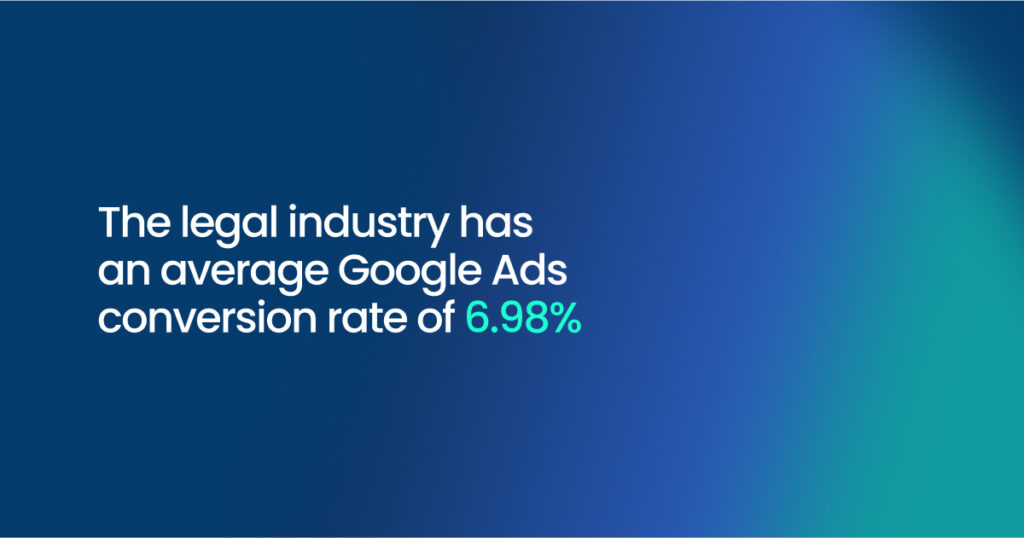
(source)
- Intense Market Competition: The personal injury law sector is highly competitive, with numerous firms vying for prospective clients’ attention.
This saturation can make it challenging for individual firms to stand out and differentiate themselves from the crowd.
- Reputation Management Challenges: Maintaining a positive reputation is paramount for legal marketing. Reputation directly impacts client trust and retention.
Negative reviews, unfavorable media coverage, or even a dissatisfied client can harm a firm’s reputation and deter potential clients from seeking their services.
Personal Injury Advertising Strategies
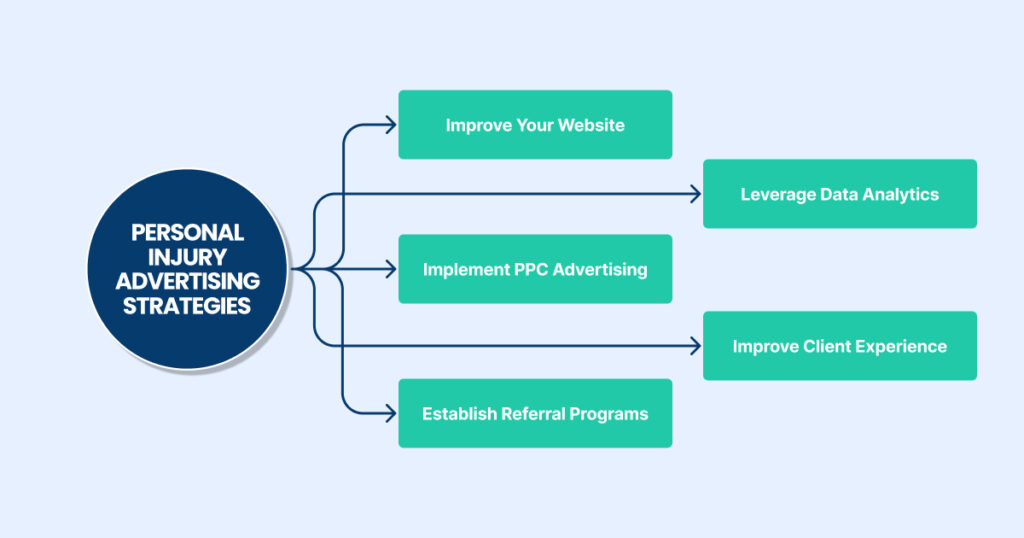
Below, we unveil five game-changing tactics to improve your firm’s visibility and attract new clients.
1. Strong Online Presence and Visibility
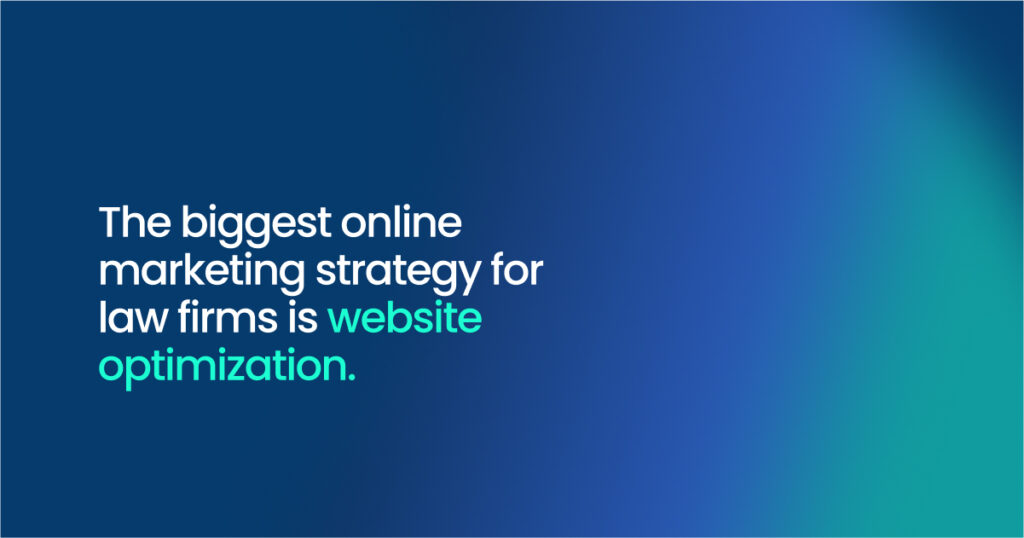
(source)
This strategy focuses on leveraging SEO techniques to drive more traffic to your website and increase client inquiries.
Optimize Website Content
Effective website content optimization involves strategically incorporating relevant keywords on your website to improve its visibility in search engine results.
Here’s how to do it:
- Conduct Keyword Research: Use platforms like Google Keyword Planner, SEMrush, and Moz Keyword Explorer to identify relevant phrases that potential clients will likely search for when seeking legal assistance in personal injury cases.
- Incorporate Keywords Naturally: Once you’ve identified relevant keywords, it’s essential to incorporate them naturally into your website’s content. You can include target keywords in page titles and headings, for instance, to signal to search engines the relevance of your content.
For instance, a page titled “Experienced Personal Injury Lawyer in [City]” effectively incorporates the keyword “personal injury lawyer” while providing valuable information to visitors.
Improve Website Speed and User Experience
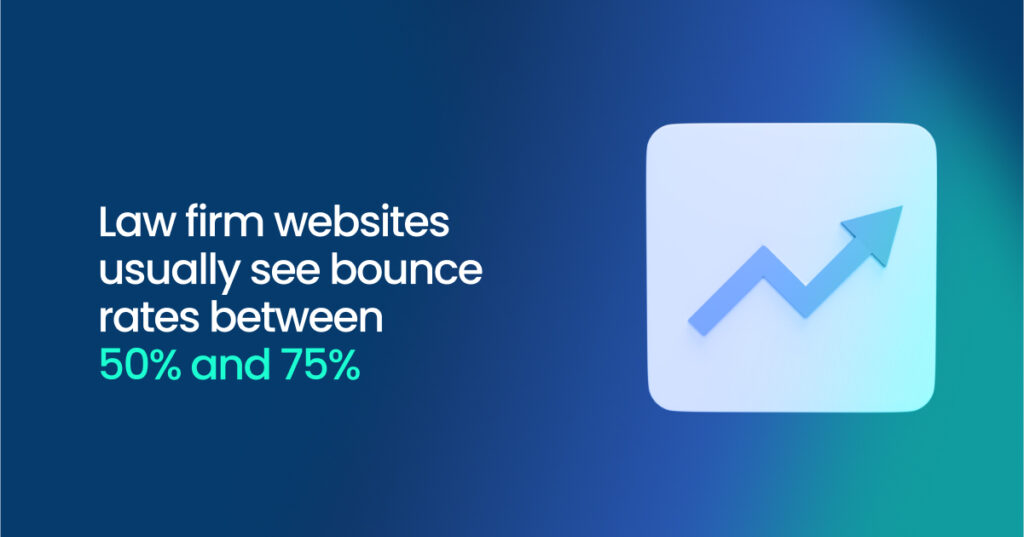
(source)
Your website’s performance, particularly its speed and user experience, plays a crucial role in captivating and retaining visitors.
You must lower the bounce rate as much as possible. The bounce rate shows how many visitors leave your site after viewing just one page.
Here’s how to improve these aspects:
- Optimize Page Load Times: Minimize unnecessary elements such as large images or excessive plugins that can slow down your website’s loading speed. Utilize tools like Google’s PageSpeed Insights to identify opportunities for improvement and implement recommended optimizations.
- Ensure Mobile Responsiveness: Many people access websites on mobile devices. So, ensure that your website looks and works well on mobile devices.
- Streamline Navigation: Organizing content logically and implementing clear menus and navigation bars. Make it easy for visitors to find the information they’re looking for without navigating numerous pages.
- Improve Readability: Use legible fonts, appropriate font sizes, and sufficient whitespace to improve readability and user experience.
Build Quality Backlinks
These are the links from other websites citing your website.
Building high-quality backlinks can significantly improve your website’s authority and visibility in search engine results.
Here’s how to do it:
- Develop High-Quality Content: Create valuable, informative content that other websites in your industry or niche would find relevant and valuable to link to.
- Outreach and Networking: Reach out to other websites, bloggers, journalists, and influencers in your industry to promote your content and request backlinks.
- Participate in Guest Blogging: Contribute guest posts to reputable websites or blogs in your industry.
- Monitor and Disavow Toxic Backlinks: Regularly audit your backlink profile to identify and remove or disavow low-quality or spammy backlinks that could harm your website’s credibility and rankings.
2. Pay-Per-Click (PPC) Personal Injury Advertising
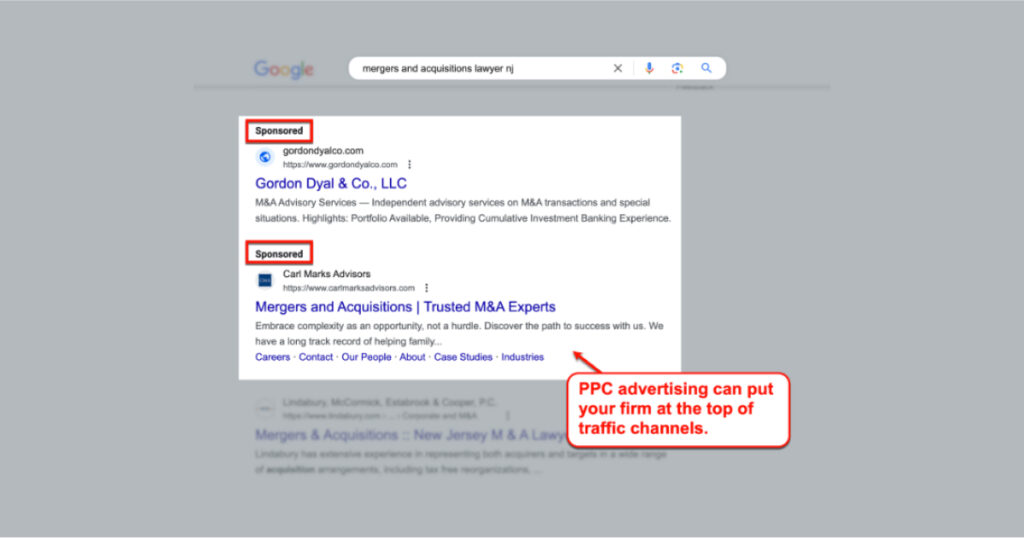
(source)
With PPC, you can strategically target your ads to individuals seeking legal assistance.
Let’s break down the PPC ad strategy step by step for the example keyword “car accident attorney”:
- Keyword Selection: You’re already familiar with keyword research. Let’s choose the keyword “car accident attorney” as the focus of your PPC campaign. This keyword targets individuals who have been involved in a car accident and are seeking legal assistance.
- Ad Creation: Craft compelling ad copy highlighting your firm’s expertise in handling car accident cases. Include relevant keywords, such as “car accident attorney.”
- Bid Management: Set an appropriate bid for your PPC campaign to ensure your ads appear prominently on search engine results pages. Monitor and adjust your bids regularly.
- Landing Page Optimization: Create dedicated landing pages tailored to users searching for “car accident attorney.” Ensure your landing pages provide relevant information, such as services offered, testimonials, and contact information, and are optimized for conversions to encourage users to contact your firm.
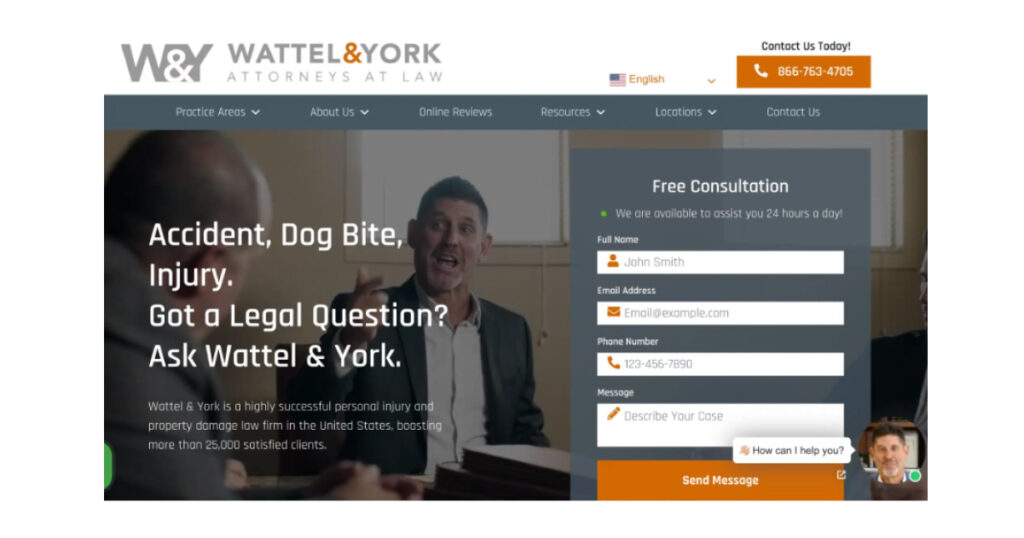
3. Maximizing the Potential of Referral Programs
Referral programs can be powerful tools for personal injury law firms to expand their client base and improve their reputation within the legal community.
By establishing strong relationships with referral sources, incentivizing referrals, and tracking program performance, firms can maximize the effectiveness of their referral programs.
Connect with Referral Sources
Other attorneys, medical professionals, and satisfied clients can be referral sources.
Law firms can encourage referrals and ensure a steady stream of potential clients by fostering trust and communication.
Incentivizing Referrals through Rewards and Recognition
Offering incentives such as monetary rewards, discounts on services, or recognition through referral appreciation events can motivate referral sources to promote your firm actively.
By recognizing and rewarding their contributions, firms can strengthen relationships and encourage ongoing referrals.
4. Leveraging Data Analytics for Decision-Making
Every decision you make must bring you closer to your goal of attracting more clients and growing your personal injury law practice.
To do that, you must leverage your customer data.
Let’s dive into how law firms can effectively use data analytics to their advantage.
Use Analytics Tools to Track Your Personal Injury Advertising Performance
Imagine you’re running an online advertising campaign to promote your personal injury law firm’s services. Google Analytics can help you to track various metrics such as:
- Website Traffic: People visiting your website from your ads.
- Conversion Rates: How many visitors fill out a contact form or call your office?
- User Behavior: Actions taken by visitors on your website.
For example, if you notice a high bounce rate on a particular landing page from your ad campaign, it may indicate that the page isn’t effectively capturing visitors’ interest.
You can optimize the page to improve engagement and conversion rates with this insight.
Analyzing Key Metrics to Optimize Personal Injury Advertising Strategies
Let’s say you’re running multiple personal injury advertising campaigns across different platforms, including Google Ads and social media.
Analyzing key metrics from each campaign can help you identify what’s working and what’s not:
- Click-Through Rates (CTR): Compare the CTR of different ads to see which ones attract the most clicks.
- Cost per Acquisition (CPA): Calculate the cost of acquiring a new client through each campaign to determine which channels offer the best ROI.
- Conversion Rates: Evaluate which campaigns drive the highest conversion rates, such as generated leads or cases acquired.
For instance, if you find that your Facebook ads generate a higher number of leads at a lower cost than your Google Ads campaign, you may decide to allocate more budget to Facebook advertising to maximize your returns.
Boosting ROI in Personal Injury Lawyer Marketing
Employing data to guide your marketing decisions guarantees that each dollar you invest brings the highest possible return.
Through ongoing monitoring and analysis of campaign performance, you can swiftly adapt and refine your marketing strategies to ensure optimal outcomes.
- Refining Targeting: Adjust ad targeting parameters based on demographic data and user behavior insights to reach your ideal audience more effectively.
- Iterating Messaging: Tailor your ad messaging based on performance data and audience feedback to resonate better with potential clients.
- Budget Allocation: Allocate your marketing budget to channels and campaigns that yield the highest ROI, ensuring you get the most bang for your buck.
5. Enhancing Client Experience and Reviews

Client satisfaction and positive reviews are invaluable assets for personal injury law firms.
By prioritizing exceptional client service and actively soliciting and managing client reviews, firms can bolster their reputation and attract more clients.
- Providing Exceptional Client Service: From the initial consultation to case resolution, ensuring clients feel supported, informed, and valued can make all the difference.
For example, promptly responding to client inquiries, providing regular case updates, and offering compassionate support during challenging times can leave a lasting impression on clients.
- Encouraging Satisfied Clients to Leave Positive Reviews: Satisfied clients are often willing to share their positive experiences with others, making them valuable advocates for your firm.
Google My Business, Yelp, or Avvo are great platforms for clients to leave reviews.
- Responding Promptly and Professionally to All Client Feedback: Every client interaction, whether positive or negative, presents an opportunity to demonstrate your firm’s commitment to client satisfaction.
Respond promptly and professionally to all client feedback, addressing concerns or issues raised with empathy and diligence.
Hiring a Growth Marketing Agency for Your Personal Injury Law Firm

If managing all these strategies feels overwhelming, consider partnering with [A] Growth Agency.
Our experts specialize in propelling law firms forward with data-driven strategies.
With us handling your law firm marketing needs, you can concentrate on serving your clients, knowing your firm’s growth in the competitive legal industry is in good hands.
